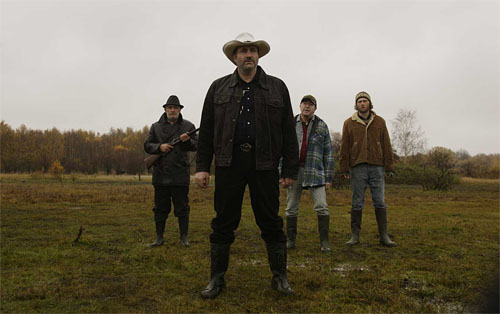Review: Terribly Happy

Films about small-town decline and despair share many hallmarks. No matter the setting, the themes and stories often are similar, with residents of blighted rural burgs living hapless lives against a crumbling backdrop of poverty and isolation, surviving on a familiar stoicism that barely masks their underlying frustration.
Thus, the brilliantly told story of Terribly Happy -- a Danish import that played Fantastic Fest 2009 and is back in Austin at the Arbor this week -- has a universal appeal, as it could have happened in any small town from the Australian Outback to the Texas Panhandle. A dark and sometimes darkly comic thriller set in a dreary town near Copenhagen, Terribly Happy has much in common -- in a good way, that is-- with other films about rural life: The locals mind each other's business more often than minding their own, have little use for big-city ways, and rely on their own brand of frontier justice and morality to sort out good and evil. Above all, they welcome outsiders with a mix of suspicion and hostility.
The outsider in Terribly Happy is Robert Hansen (Jakob Cedergren), a Copenhagen police officer reassigned to a new job as marshal of a soggy and sad provincial town in the marshy flatlands of southern Denmark. After a mental breakdown and violent episode involving his family, Robert has been exiled to the hinterlands in hopes that a few months of low-stress police work will settle his nerves enough to return to his former life.
The new job is predictably boring at first, but Robert soon discovers that the townsfolk are keeping a few dark secrets. He also learns that the town bully, Jorgen Buhl (Kim Bodnia), is beating his wife, Ingerlise (Lene Maria Christensen). Robert tries to convince Ingerlise to file a complaint against Jorgen. She refuses his help, fearing more serious abuse. But the two share a bond as shunned outsiders, a bond that leads to overt flirting and fuels the inevitable small-town gossip mill. Robert soon makes an enemy of the ragingly jealous Jorgen, and things quickly spiral downward into a classic noir tale of death, wrongful accusations, and vigilante justice.
Terribly Happy is an aptly ironic title for this somber and thoughtful film, in that no one in it is the least bit happy. The sullen locals lead perpetually hopeless lives under perpetually overcast skies, and what passes for happiness stems mostly from heavy drinking, drug use, and emotionally empty sexual encounters. Director and co-writer Henrik Ruben Genz and writer Dunja Gry Jensen create a relentlessly grim world populated with hostile, self-loathing characters, but they do imbue them with enough quirkiness to lighten the mood with glimmers of dark humor.
The plot twists give everyone plenty to do, and the film's moral questions about crime, punishment, and the true meaning of justice give the characters (and the audience) plenty to think about. There also is an unsettling realism to the story, in that Terribly Happy is inspired by true events. Jorgen, Ingerlise and their young daughter, Dorthe (Malthilde Maack), are real people; they're family members of novelist Erling Jepsen, whose novel Terribly Happy is the basis for the film.
Cedergren is very effective as Robert, subtly portraying his struggle to reconcile his duty to enforce the law with the town's twisted moral code and his desire to be accepted. Christensen's Ingerlise is a complex and convincing blend of battered wife and femme fatale; she's both deeply troubled and a lot of trouble, invoking equal amounts of sympathy and scorn. As Jorgen, Bodnia deftly handles the often thankless acting task of humanizing a monster, giving Jorgen's alcoholism and inner demons their due without defending his indefensible cruelty. And Maack is perfect in the minor but pivotal role of Dorthe, with an angelic face, an underlying worldliness, and coping skills any adult would envy.
While it borrows many elements from other films, Terribly Happy also is intriguingly original. It's plenty smart and just twisted enough to be a fresh and engaging mix of small town cultural study and noir thriller, satisfying fans of both genres.

